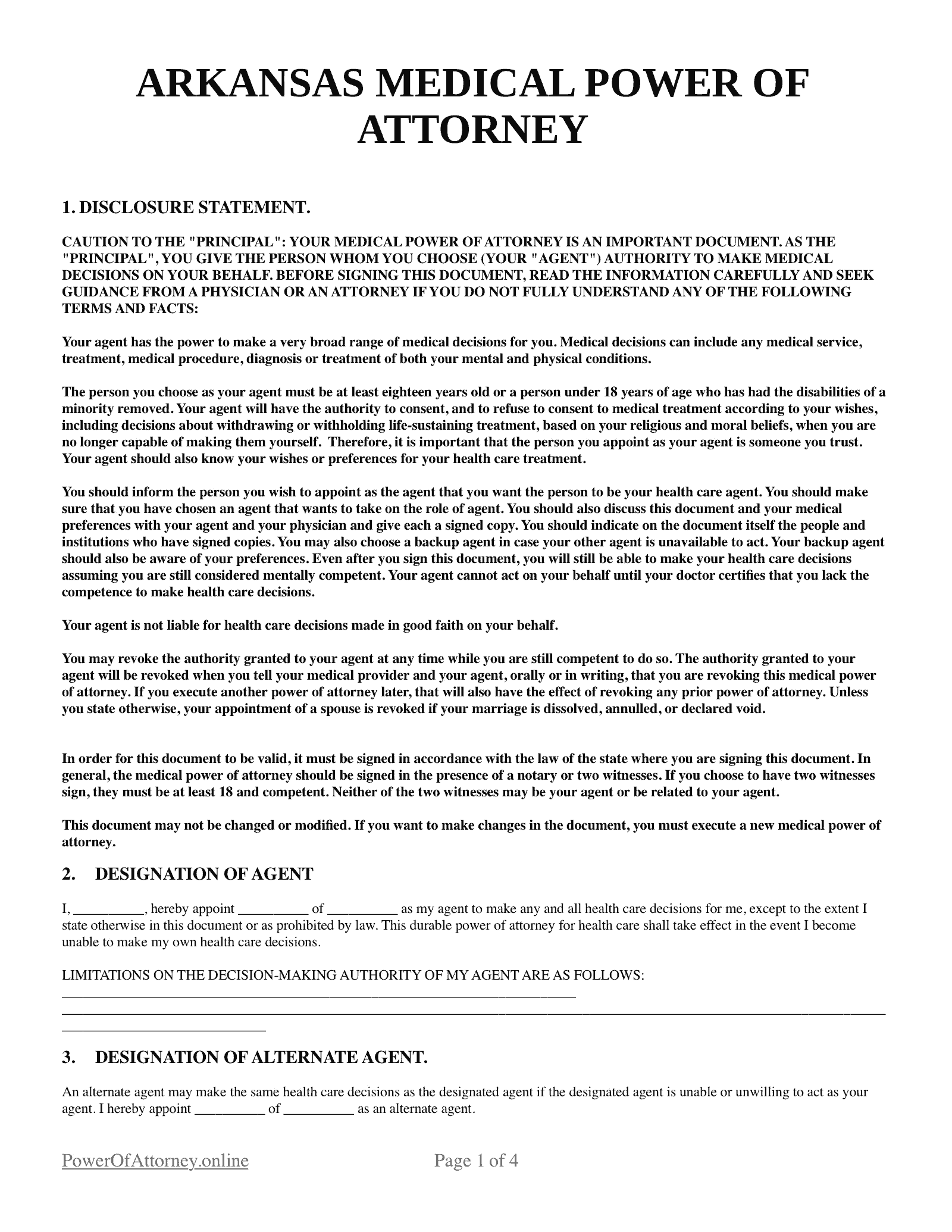Free Arkansas Medical Power of Attorney Forms
Individuals in Arkansas who want to ensure continuous healthcare management, even if they become incapacitated or mentally incompetent, can enforce a legal document referred to as a medical power of attorney (POA). As the person granting authority (or the principal) to an agent who will handle their healthcare concerns and transactions, the document contains their healthcare-related preferences and instructions that the agent must carry out.
The medical power of attorney is durable, which means it continues to be in effect in case of incapacity or incompetence when the principal is no longer able to make decisions for him or herself.

Arkansas Medical Power of Attorney Laws
**Arkansas Code § 20-6-103: Arkansas Healthcare Decisions Act **- The law stipulates the guidelines of the medical POA in Arkansas. It states: “A durable power of attorney for health care remains in effect notwithstanding the principal's latest incapacity and may include a living will or other individual instructions” (Arkansas Code § 20-6-103(b3).
Signing Requirements in Arkansas
The principal must sign the document in front of a notary public or two adult witnesses. Further, “at least one of the witnesses is not related to the principal by blood, marriage, or adoption and would not be entitled to any portion of the estate of the principal upon the death of the principal under any will or codicil made by the principal existing at the time of execution of the advance directive or by operation of law” (Arkansas Code § 20-6-103(c2)).
How to Write a Medical POA in Arkansas
With the authority of a medical POA, an agent acts on behalf of the principal by making healthcare decisions regarding medications and treatments. Here are the steps to create a medical POA in Arkansas:
1. Choose your agent
Choose an agent whom you trust since the individual will be making important healthcare decisions for you. In most cases, a family member is the most logical choice for an agent. It could be the principal’s spouse, child, or sibling. Note that you can also choose someone who isn’t related to you.
2. Discuss responsibilities and compensation
The responsibilities of the agent include approving medications, treatments, and medical procedures. The agent may also decide whether it is appropriate for the patient or principal to be admitted to a medical facility or a home. In some cases, the agent is also tasked with making difficult end-of-life healthcare decisions when the time comes.
Agents have the right to collect compensation for taking on the role. In addition to a regular wage, they can be reimbursed for lodging, transportation, food, and other expenses incurred as they carry out their responsibilities. However, some agents who are related to the principal choose to waive their fees since they see their role as a matter of personal duty to a loved one.
3. Download the Arkansas Medical Power of Attorney Form
You can get an Arkansas medical power of attorney form from a lawyer in the state, but you can also download a printable template to save money. Ready-made templates generally have the standard acceptable wording, so all you have to do is fill out specific details to make it personally relevant.
4. Sign the document
You need to sign the POA before a notary public to make it legal. Another option is to sign the form in front of two adult witnesses. At least one of the witnesses must be unrelated to you by blood, marriage, or adoption. Moreover, the witness should not be a beneficiary of the principal’s will.
5. Use the Arkansas Medical Power of Attorney
The principal, notary public, and agent should each have a copy of the medical POA. The agent will need to present their copy when making healthcare decisions on behalf of the principal. This includes scenarios such as when medications are refilled and if the principal undergoes a medical procedure or treatment.